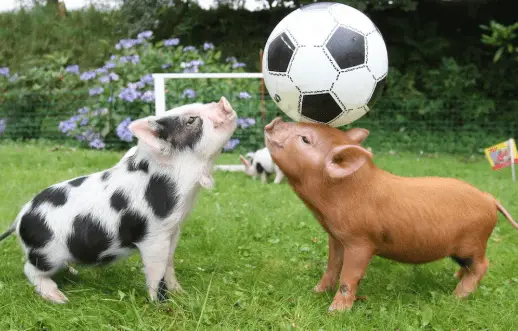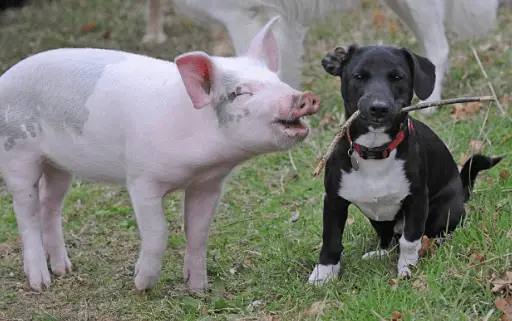Have you ever owned a pet pig before? If you haven’t, you will be surprised to know how amazing pigs can be!
What is a pig’s normal behavior and how smart are they? You’ll learn everything in this article.
Pigs are normally sociable, gentle, peaceful and curious animals. They behave positively most of the time and are rarely a problem for owners. Pigs also ranked fifth among the most intelligent animals in the world! Studies also suggest they can be smarter than dogs and have the intelligence level of a 2 year old child.
It might be news for some people and it is totally understandable. Many of us were taught that pigs were bad, emotionless, filthy, unintelligent and selfish animals.
But the truth is, behind that stigma, is an animal shining with their own unique brilliance. They have their own pros and cons just like people and other animals, but pigs can really be great for someone’s preferences.
For many years, scientists have been studying everything they can about pigs in order to further understand the misunderstood creature.
Several observations react with a lot of positive feedback for the animal. Farmers also have nothing but praise for their pigs most of the time. They are low maintenance animals that will not give you a lot of problems.
At first, they may be an unknown entity for new owners… but once someone get past through that stage, there will be nothing else to worry about.
There are times when they MIGHT misbehave but there will be definitely a proper reason behind that. Most pigs are smart and if ever you are having a hard time with your pig, there must be a reason.
Pet owners must be patient and understand that owning or raising an animal comes with great responsibility and demands commitment.
This will serve as your guide to fully understand a pig’s nature and how their intelligence affects their lives including yours.
How a pig’s intelligence affect their Cognitive Skills and Reactions
A pig’s behavior is deeply affected by their intelligence. Their intelligence allows them to feel both negative and positive emotions and they also have great memory.
After thoroughly researching and examining credible studies about this topic, we’ve come up with the best summary for you to easily read them.
We gathered only the most important parts to compile it into one article.

How pigs perceive the world with the help of their intelligence
Being one of the most intelligent, you would expect that they truly have a lot to offer. The brain is able to comprehend different elements and thus have different functions.
How do we perceive our environment? How do we react to it? How do we solve problems or get out of risky situations? How can we tell if we are in danger?
Also… how do we perceive another being? How do we socialize? Can we perceive time? Are we self-aware?
Our mind or our intelligence processes these situations or scenarios and enables us to react, adapt and comprehend.
This is the same for animals like pigs.
Luckily, several studies answered all of these possible questions and that is how we came up with the conclusion that pigs are truly one smart animal.
1. How pigs perceive and react to their surroundings
Naturally, a domestic pig has several limitations unlike their wild counterparts but both can understand and remember a lot of things very well.
They are pretty clever and can learn their names as fast as they reach two to three weeks old. Despite their young age, they will know how to respond when called.
They are born with poor eyesight but their great sense of smell and hearing makes up for it. Pigs will remember the scent of their surroundings.
They will remember areas where they can find food and water. They will also remember the scents of their enemies (predators) and that is how they can avoid being attacked.
A pig’s intelligence is also the reason behind their curious personalities.
They will examine their surroundings and react to it depending on the situation and what their body needs for survival.
Pigs also know the difference of clean and messy. As much as possible, pigs prefer to stay clean and away from dirt. This proves that they are aware of what’s better than the other.
They also know if they are confined under tight spaces. In all truth, there are animals who do not mind being kept under strict conditions because their intelligence is not enough to comprehend the severity it can cause.
Meanwhile, the mind of a pig allows them to realize what is good for their health and not. This is why confining a pig or simply isolating them can cause a negative impact for their mental health.
Despite having poor eyesight, they can also perceive high and low areas which mean they are aware of what “heights” mean.
Pigs know when they can fall off or when the terrain is dangerous or risky.
Though this is not uncommon among most animals, there are still several animals that cannot sense the type of environment they are moving in and tend to get into accidents.
Pigs can also react and adapt to the climate which clearly means they do perceive the seasons normally. They also seem to be aware of the passage of “time”.
Depending on the time and season, pigs may adjust their sleeping routine as well as their foraging habits.
2. How pigs perceive people and other animals
Domesticated pigs are often used to the presence of fellow pigs, other farm animals, and humans. Depending on how well they were raised and treated, their social comprehension may differ.
Naturally, pigs perceive people as predators and the same goes for other animals excluding smaller animals and fellow pigs.
Despite this, domestic pigs often act neutral around those they consider predators because of the way they were developed.

In the wild, a pig will perceive people as a dangerous threat and when alarmed, the pig will either flee as quickly as they can or charge as a way to establish their dominance at a certain territory.
Depending on the breed, pigs may see fellow pigs as competitors or family. Most of the time, they just see each other as one big family or group of friends.
They will behave naturally around those they trust and can definitely differentiate angry individuals from normal ones and thus they will react depending on the situation.
When man befriends a pig, they will perceive the person as their parent, offspring, friend or leader.
Pigs are herd animals and usually, they may see their owners as their “leader” or “friend”. For some cases, pigs may try to become the “leader” but of course, that rarely happens as pigs cannot outsmart most people.
Their perception and reaction heavily relies on how they are treated and they can comprehend then differentiate good actions from bad ones.
3. Self-awareness in pigs
So far, scientists still haven’t confirmed whether pigs do have self-awareness or not.
However, several observations stated that pigs do exhibit some signs of self-recognition and reacts upon seeing their own reflection in the mirror.
The only tricky part for our scientists is if the pig knows it is them in the reflection or not.
Whether pigs have self-awareness or not, it does not change the fact that they are still one of the brightest.
Pigs know what they want, develop their personal preferences, have individual personalities and know how to prioritize their survivability.
These facts alone are enough to support the theory of self-awareness among pigs.
How intelligence in pigs affect their emotions
Did you know that studies state that a lot of smartest people tend to be the most emotional which often lead to depression?
Their high level of intelligence allows them to comprehend things that the average minds often do not even bother to think about.
For some people, they may call it “overthinking”.
It’s not surprising because the brighter someone is, the more ideas can fit in their brain and the more they will have to think which can be mentally draining to the point that it affects emotions.
Pigs are not exempted from this as their high intelligence level is the reason why they are one of the most sensitive animals you can come across with.
1. Happiness in pigs
Pigs do feel emotions and they can be one of the happiest animals when they are treated right. They can be energetic and fun to be with.
Signs of joy, excitement and contentment in pigs can be found through tail wagging, high energy, speed running, playful actions and even smiling.
Yes, pigs can smile too! They can become a literal bundle of joy.
Curious to learn more? Read smiling pigs by clicking the blue texts.
Pigs can also learn how to be grateful. They will remember the good things you’ve done for them and can grow fond of you much faster. Sometimes, they can also be protective like dogs.
2. Grieving and Grudges
Similar to what was stated in the first sections, pigs are aware when you abandon them. They are aware of “time” and when a companion passes away in life.
They know how to grieve to the point of crying real tears.
When a pig is abused, mistreated or traumatized… they also know how to hold grudges and they can show that by protesting in their own ways.
Pigs will act stubborn, territorial and can be violent or aggressive towards people who hurt them and hold grudges against.
This alone proves that they are truly sensitive and emotional beings with great intelligence.
3. Depression in pigs
Related to the above example, pigs can get depressed too.
Depression in pigs is actually not uncommon and can happen any time. There are many possible reasons why a pig can be depressed, just like us.
Surprisingly, they have big, loving hearts just like your average pet cat or dog.
When a pig is depressed it can be as deadly as it is for people. They tend to become self-destructive as much as human beings. They will stop eating and intentionally hurt themselves.
Another proof that a pig’s intelligence that controls their emotion is not to be underestimated.
Common behavior of pigs
Another factor which intelligence affects and can control is temperament. Now, there is a difference between temperament and personality.
Temperament is a common or shared trait inherited from parents or ancestors. Personality is born from temperament and it is what makes a living being become an “individual”.
A pig’s temperament can vary depending on the breed, but what will be listed below should be the most commonly shared and observed traits among them.
1. Pigs are docile
Generally, they are docile creatures regardless if they are wild or domesticated. Wild ones will remain calm as long as they are not threatened which means they are still considered docile.
They are normally quiet and only make sounds when in their safe territory as a form of expression and communication.
Any improper behavior can be easily corrected by simple verbal disciplining because of their docile temperament.
They are peaceful animals and are rarely violent.
One point to remember is that they are prey animals. They are usually on edge compared to predators and that makes them vulnerable and that probably contributed to their docile trait.
2. Pigs are social
All pigs are born social and can be found in herds or groups of two or more.
A boar (male pig) can thrive alone and MIGHT prefer isolation at one point but most of them are social creatures and it is part of their nature.
This means they can easily form bonds even with other animals including humans. They can grow attached to someone when they know they are being treated properly.
3. Pigs are curious
You can rarely encounter a pig that is not curious at all. Being smart, they tend to want to know everything around them and sometimes, even the ones beyond them.
They will roam and explore on their own because they want to fulfill their curiosity.
When they already know or familiar with their current area, they may not be satisfied and keep going until they are forced to stop.
This should not be confused with greediness.
Pigs simply want to know more in order to adapt better and it is not something humans can take away from their nature.
What are the benefits of intelligence for pigs
How do pigs express themselves? Most of the time, they don’t have the opportunity to truly show how wonderful they are because of the bad image the world created for them when in reality, they are not bad.
A pig’s life is dictated by those who own and raise them but the lucky ones who get to have the freedom to show their personalities are one of the reasons why we are slowly starting to know the truth behind pigs.
For many years, we believed they are good for nothing except as food to consume.
Luckily, pigs are getting out of the negative zone we put them in and we are learning more interesting things about pigs.
Life expectancy
The life expectancy of an average pig can get up to 15 and 20 years. It’s very long compared to wild pigs which are known to live only up to 4 and 8 years.
Their intelligence help allow pigs to have higher survivability rate regardless if they are wild or domesticated.
You may read: “How do pigs protect themselves from predators?” for a related topic.
Related Questions
- Do pigs recognize their owners?
Yes, pigs can recognize their owners and are studied to be capable of recognizing multiple other people and fellow animals.
They can differentiate the scent, tone of voice, facial structures and even the way of interaction and that is how they can recognize their owners.
Most pigs can learn their names as fast as they reach two to three weeks old and they know how to respond when called, this is not different from recognizing people and other animals.
They can probably remember their owners even after a few months to years of not seeing them. They will also recognize their abusers or remember anyone who wrongly treats them.
That is how strong and amazing a pig’s memory can be!
Pigs can also be house trained and according to many owners, they may even learn faster than cats and dogs. Some even claim they are easier to handle compared to the common house pets that we know.
- Do pigs cry?
Yes, pigs can cry and they can cry real tears.
Pigs are capable of sensing grief from other animals, their companions or their human owners. When they do, they have a tendency to console them for comfort.
They are aware when a companion passes away or when they get left behind or abandoned. They can be sad, depressed and lonely to the point of crying real tears when mourning their loss or simply missing something or someone.
A pig is usually a compassionate animal and they must be handled with genuine love and care.
